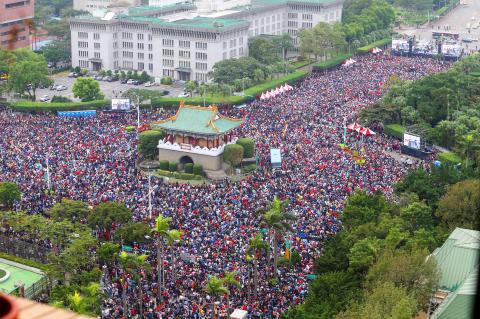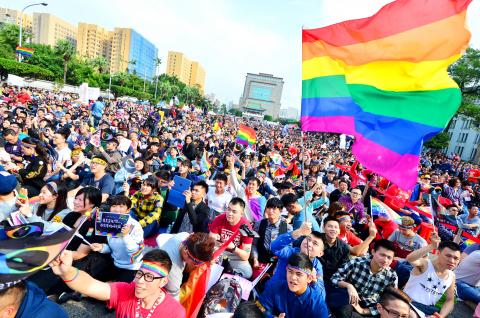As many as 250,000 participants waved rainbow flags and placards at a star-studded benefit concert in front of the Presidential Office on Dec. 10, making it one of Asia’s biggest events ever in support of lesbian, gay, bisexual, and transgender (LGBT) rights.
Coinciding with Human Rights Day, the event was part of the LGBT community’s ongoing fight to make sure that the legislature would promptly pass the draft amendments to the Civil Code (民法) to legalize same-sex marriage.
It was the first time attending a gay rights event for many concertgoers, who said that they finally decided to take action after watching the recent anti-gay TV commercials sponsored by the Happiness of the Next Generation Alliance (or “Happiness Alliance,” 幸福盟), formed by the Alliance of Taiwan Religious Groups for the Protection of the Family (or “Family Alliance,” 護家盟) and a handful of Christian groups.

Photo: CNA
Happiness Alliance has spent tens of millions of New Taiwan dollars to run the commercials that spread lies and hatred, claiming that if the legislature passes the draft bills, terms such as “father” and “mother” will disappear and family structure will collapse.
In response, some celebrities have chosen to publicly “come out of the closet.” From film director Yee Chih-yen (易智言) to entertainment agent Isaac Chen (陳鎮川) and TV host Chen Hong (陳鴻), their brave actions have helped increase the visibility of homosexuality in Taiwan’s society.
HYPOCRITICAL ACTIONS

Photo: Wang Yi-sung, Taipei Times
Concert attendees also condemned the assault on Kevin Yang (楊凱鈞), a gay man who was attacked for waving a rainbow flag near a rally organized by the alliance a week earlier.
“People kicked, beat and splashed coffee on me while others stood and laughed,” Yang wrote on his Facebook page. “Are these the family values that they are protecting? They make me feel sick to my stomach.”
Yang reportedly suffered a fractured rib and was rushed to the hospital. He is pressing charges against the alliance. At the same rally, transgender Wu Hsin-en (吳馨恩) was choked by LGBT-haters, who even tried to rip off her pants. Luckily, the police came to her rescue.
Given these cases, it is ironic that some alliance members have launched a campaign against so-called “rainbow terror” (彩虹恐怖), accusing homosexuals of “bullying” them. Are they creating a new definition for the word “bullying?”
Judicial Reform Foundation (司法改革基金會) chairman Lin Yung-sung (林永頌) echoed the alliance’s accusations by labeling the call for marriage equality “homosexual hegemony” (同性戀霸權). Stunned by the chairman’s discriminatory remarks, several lawyers have announced their withdrawal from the foundation.
Family Alliance secretary-general Andrew Chang (張守一) also made the headlines for his remarks during a public hearing at the Legislative Yuan on Nov. 24. “If people in same-sex relationships are allowed to wed, can people also marry a ferris wheel if they want?” he asked.
Chang and his cult vow to protect traditional family values. However, Next Magazine (壹週刊) uncovered earlier this month that he had an extramarital affair that resulted in a daughter. Is he trying to restore the ancient family structure, under which a man had “three wives and four concubines” (三妻四妾)?
Chang has been criticized as a true hypocrite since the news broke, and even his son disapproves of his father’s stance. “Other people’s marriages are none of your goddamn business” (別人結婚,干你屁事), the son posted on Facebook.
HEATING UP
Meanwhile, the issue is heating up at the Legislative Yuan, and both Democratic Progressive Party (DPP) caucus whip Ker Chien-ming (柯建銘) and his Chinese Nationalist Party (KMT) counterpart Sufin Siluko (廖國棟) have tried hard to delay the draft bills at the legislature’s Judiciary and Organic Laws and Statutes Committee.
Ker suggests a “special law” (專法) for same-sex couples exclusively, instead of amending the Civil Code. This falls short of the LGBT community’s expectations, as a special law will highlight the difference between heterosexuals and homosexuals and draw a line between them.
Moreover, an exclusive law is usually made to require the government to do more for a specific group. For example, the People with Disabilities Rights Protection Act (身心障礙者權益保障法) demands that the government make greater efforts to protect disabled people. But LGBT people are not asking the government to do more for them. They are simply asking for equal treatment.
Currently, the legislature is scheduled to clear committee reviews of the draft bills tomorrow. Since this legislative session is about to end next week, the draft bills will then be discussed during cross-caucus negotiations in next session between February and May next year. Through their negotiations, the caucuses will decide whether to put them on the agenda for a second and third reading.
The day after the benefit concert, Sufin Siluko told the media he would definitely block the draft bills during the upcoming cross-caucus negotiations. Obviously, the two caucus whips have been hijacked by radical Christians, while completely ignoring the call of a quarter-million people.
Taiwan is not a Christian country, and certain religious groups’ interference with the legal process in the name of Jesus Christ is just unacceptable. It’s shameful of the Alliance of Crying for Hope (搶救台灣希望聯盟) and some Christian groups to stir up their followers to break into the Legislative Yuan again.
To ensure that the committee reviews of the draft bills will be cleared, the LGBT community is launching another rally in front of the Legislative Yuan tomorrow. Hopefully, their voice will be heard this time.

May 26 to June 1 When the Qing Dynasty first took control over many parts of Taiwan in 1684, it roughly continued the Kingdom of Tungning’s administrative borders (see below), setting up one prefecture and three counties. The actual area of control covered today’s Chiayi, Tainan and Kaohsiung. The administrative center was in Taiwan Prefecture, in today’s Tainan. But as Han settlement expanded and due to rebellions and other international incidents, the administrative units became more complex. By the time Taiwan became a province of the Qing in 1887, there were three prefectures, eleven counties, three subprefectures and one directly-administered prefecture, with

Taiwan Power Co (Taipower, 台電) and the New Taipei City Government in May last year agreed to allow the activation of a spent fuel storage facility for the Jinshan Nuclear Power Plant in Shihmen District (石門). The deal ended eleven years of legal wrangling. According to the Taipower announcement, the city government engaged in repeated delays, failing to approve water and soil conservation plans. Taipower said at the time that plans for another dry storage facility for the Guosheng Nuclear Power Plant in New Taipei City’s Wanli District (萬里) remained stuck in legal limbo. Later that year an agreement was reached

What does the Taiwan People’s Party (TPP) in the Huang Kuo-chang (黃國昌) era stand for? What sets it apart from their allies, the Chinese Nationalist Party (KMT)? With some shifts in tone and emphasis, the KMT’s stances have not changed significantly since the late 2000s and the era of former president Ma Ying-jeou (馬英九). The Democratic Progressive Party’s (DPP) current platform formed in the mid-2010s under the guidance of Tsai Ing-wen (蔡英文), and current President William Lai (賴清德) campaigned on continuity. Though their ideological stances may be a bit stale, they have the advantage of being broadly understood by the voters.

In a high-rise office building in Taipei’s government district, the primary agency for maintaining links to Thailand’s 108 Yunnan villages — which are home to a population of around 200,000 descendants of the Chinese Nationalist Party (KMT) armies stranded in Thailand following the Chinese Civil War — is the Overseas Community Affairs Council (OCAC). Established in China in 1926, the OCAC was born of a mandate to support Chinese education, culture and economic development in far flung Chinese diaspora communities, which, especially in southeast Asia, had underwritten the military insurgencies against the Qing Dynasty that led to the founding of